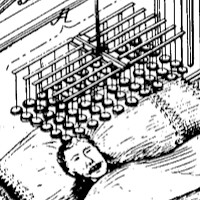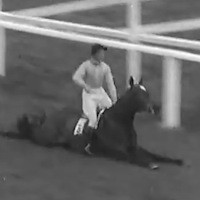The Week in History from September 7

September 7
1533: Elizabeth I is born in Greenwich, London. The daughter of Henry VIII and Anne Boleyn, she became Queen of England and Ireland at the age of 25, presiding over such luminaries as Shakespeare, Francis Bacon, and explorers Francis Drake and Walter Raleigh. England’s greatest military achievement during her reign was the 1588 defeat of the Spanish Armada.
1986: Desmond Tutu becomes archbishop of Cape Town, the first black South African to hold the position. Two years earlier, he had won the Nobel Peace Prize for his advocacy of non-violent opposition to apartheid. He continued to criticize apartheid, which ended in 1991, and he retired two years after Nelson Mandela was elected president.
September 8
1504: Michelangelo’s David is unveiled on the Piazza della Signoria in Florence, Italy. It had taken the artist three years to sculpt this masterpiece. At a little over 31 feet, including the base, it was the first large statue of a nude to be exhibited in a public area since ancient times. It was moved to its current location, the Galleria dell’Accademia, in 1873.
1921: Margaret Gorman of Washington, D.C., wins the first Miss America beauty pageant. Designed to persuade tourists to stay in Atlantic City for Labor Day weekend, the pageant was a two-day event. The six contestants were selected from more than 1,500 entrants and judged partially by public voting. Sixteen-year-old Gorman won the Golden Mermaid trophy.
September 9
1893: Esther Cleveland is the first child of a U.S. President born in the White House. The second child of Grover and Frances Folsom Cleveland, she was born during her father’s second term. He had lost his 1888 reelection bid but had been voted President again in 1892, itself an unprecedented event. His wife also holds a record, at 21 being the youngest First Lady in U.S. history.
1979: Tracy Austin becomes the youngest U.S. Open champion, a record she still holds. She was only 16 years, 8 months and 28 days old. After defeating Martina Navratilova in the semifinals, she beat four-time defending champion Chris Evert Lloyd in straight sets (6-4, 6-3). Austin is also the youngest athlete in the International Tennis Hall of Fame, inducted at age 29.
September 10
1608: John Smith is elected council president of Jamestown, Virginia. A leader from the outset of the settlement expedition, the 28-year-old adventurer had helped the colony to survive the brutal first year. He was captured by Powhatan warriors along with two other colonists who were both killed. Famously, Smith was spared thanks to Pocahontas, the chief’s daughter.

2014: The first Invictus Games begin, taking place over four days in London. Its name meaning “unconquered” in Latin, the event’s motto is “I Am.” It allows armed-services personnel and veterans who are wounded, disabled or sick to compete in sports. About 300 competitors from 13 countries participated in events such as archery, indoor rowing, and wheelchair basketball. (Logo courtesy of the Invictus Games Foundation)
September 11
1962: The Beatles re-record “Love Me Do” at EMI Studios in London. The third recording with as many drummers, this is the one on their debut album, Please Please Me, which hit the top of the 1963 charts. For this recording, a session drummer was hired while Ringo Starr, who had just replaced Pete Best, only played the tambourine.
2001: Almost 3,000 people lost their lives when four passenger planes were hijacked by terrorists in the September 11 attacks. Two planes were flown into the Twin Towers of the World Trade Center in New York City, disintegrating both 110-story structures. A total of 2,753 people died; and about 10,000 more were injured. In Virginia, 184 people were killed when the third plane was piloted into the Pentagon. Later, the fourth plane crashed into a field near Shanksville, Pennsylvania, killing 40 passengers and crew members along with their hijackers, after a few passengers tried to overcome the terrorists. Memorial services for the victims are held every year in New York City and Shanksville and at the Pentagon.
September 12
1940: Four teenagers (and their dog) discover the prehistoric Lascaux cave paintings in France. Painted, drawn or engraved on the walls, the pictures are up to 20,000 years old. They show animals such as horses and deer, mythical creatures, and a bird-headed human. The number of visitors were limited in 1963 when some pictures showed damage from changes in the cave environment.
1984: Michael Jordan, 21, signs a seven-year basketball contract with the Chicago Bulls. His slam dunks were a crowd favorite, and the following year Nike introduced Air Jordan shoes. The Bulls won the NBA championship in 1991 and did it again twice, a feat known as a “three-peat.” Later, Jordan led the team in a second three-peat and a record 72 wins in the 1995-96 season.
September 13
1848: Vermont railroad worker Phineas Gage survives an accident that drove a meter-long tamping iron through his cheek and head, boring a hole in his skull. With his brain’s left frontal lobe apparently damaged, his behavior reportedly changed from responsible and hard-working to capricious and vulgar. However, these effects were temporary. Gage’s case sparked early conjectures among doctors and scientists about the functions of the brain.
1985: Nintendo releases Super Mario Bros. in Japan. The first in a series of 20 video games, it sets the adventures of plumber brothers Mario and Luigi in the Mushroom Kingdom. They attack enemies and collect coins and “power-ups” as they race to the rescue of Princess Toadstool from Bowser, King of the Koopa. The bouncy theme music is probably the most recognizable tune in video game history.
1533: Elizabeth I is born in Greenwich, London. The daughter of Henry VIII and Anne Boleyn, she became Queen of England and Ireland at the age of 25, presiding over such luminaries as Shakespeare, Francis Bacon, and explorers Francis Drake and Walter Raleigh. England’s greatest military achievement during her reign was the 1588 defeat of the Spanish Armada.
1986: Desmond Tutu becomes archbishop of Cape Town, the first black South African to hold the position. Two years earlier, he had won the Nobel Peace Prize for his advocacy of non-violent opposition to apartheid. He continued to criticize apartheid, which ended in 1991, and he retired two years after Nelson Mandela was elected president.
September 8
1504: Michelangelo’s David is unveiled on the Piazza della Signoria in Florence, Italy. It had taken the artist three years to sculpt this masterpiece. At a little over 31 feet, including the base, it was the first large statue of a nude to be exhibited in a public area since ancient times. It was moved to its current location, the Galleria dell’Accademia, in 1873.
1921: Margaret Gorman of Washington, D.C., wins the first Miss America beauty pageant. Designed to persuade tourists to stay in Atlantic City for Labor Day weekend, the pageant was a two-day event. The six contestants were selected from more than 1,500 entrants and judged partially by public voting. Sixteen-year-old Gorman won the Golden Mermaid trophy.
September 9
1893: Esther Cleveland is the first child of a U.S. President born in the White House. The second child of Grover and Frances Folsom Cleveland, she was born during her father’s second term. He had lost his 1888 reelection bid but had been voted President again in 1892, itself an unprecedented event. His wife also holds a record, at 21 being the youngest First Lady in U.S. history.
1979: Tracy Austin becomes the youngest U.S. Open champion, a record she still holds. She was only 16 years, 8 months and 28 days old. After defeating Martina Navratilova in the semifinals, she beat four-time defending champion Chris Evert Lloyd in straight sets (6-4, 6-3). Austin is also the youngest athlete in the International Tennis Hall of Fame, inducted at age 29.
September 10
1608: John Smith is elected council president of Jamestown, Virginia. A leader from the outset of the settlement expedition, the 28-year-old adventurer had helped the colony to survive the brutal first year. He was captured by Powhatan warriors along with two other colonists who were both killed. Famously, Smith was spared thanks to Pocahontas, the chief’s daughter.

2014: The first Invictus Games begin, taking place over four days in London. Its name meaning “unconquered” in Latin, the event’s motto is “I Am.” It allows armed-services personnel and veterans who are wounded, disabled or sick to compete in sports. About 300 competitors from 13 countries participated in events such as archery, indoor rowing, and wheelchair basketball. (Logo courtesy of the Invictus Games Foundation)
September 11
1962: The Beatles re-record “Love Me Do” at EMI Studios in London. The third recording with as many drummers, this is the one on their debut album, Please Please Me, which hit the top of the 1963 charts. For this recording, a session drummer was hired while Ringo Starr, who had just replaced Pete Best, only played the tambourine.
2001: Almost 3,000 people lost their lives when four passenger planes were hijacked by terrorists in the September 11 attacks. Two planes were flown into the Twin Towers of the World Trade Center in New York City, disintegrating both 110-story structures. A total of 2,753 people died; and about 10,000 more were injured. In Virginia, 184 people were killed when the third plane was piloted into the Pentagon. Later, the fourth plane crashed into a field near Shanksville, Pennsylvania, killing 40 passengers and crew members along with their hijackers, after a few passengers tried to overcome the terrorists. Memorial services for the victims are held every year in New York City and Shanksville and at the Pentagon.
September 12
1940: Four teenagers (and their dog) discover the prehistoric Lascaux cave paintings in France. Painted, drawn or engraved on the walls, the pictures are up to 20,000 years old. They show animals such as horses and deer, mythical creatures, and a bird-headed human. The number of visitors were limited in 1963 when some pictures showed damage from changes in the cave environment.
1984: Michael Jordan, 21, signs a seven-year basketball contract with the Chicago Bulls. His slam dunks were a crowd favorite, and the following year Nike introduced Air Jordan shoes. The Bulls won the NBA championship in 1991 and did it again twice, a feat known as a “three-peat.” Later, Jordan led the team in a second three-peat and a record 72 wins in the 1995-96 season.
September 13
1848: Vermont railroad worker Phineas Gage survives an accident that drove a meter-long tamping iron through his cheek and head, boring a hole in his skull. With his brain’s left frontal lobe apparently damaged, his behavior reportedly changed from responsible and hard-working to capricious and vulgar. However, these effects were temporary. Gage’s case sparked early conjectures among doctors and scientists about the functions of the brain.
1985: Nintendo releases Super Mario Bros. in Japan. The first in a series of 20 video games, it sets the adventures of plumber brothers Mario and Luigi in the Mushroom Kingdom. They attack enemies and collect coins and “power-ups” as they race to the rescue of Princess Toadstool from Bowser, King of the Koopa. The bouncy theme music is probably the most recognizable tune in video game history.

Related Articles
Editor's Picks Articles
Top Ten Articles
Previous Features
Site Map
Content copyright © 2023 by Lane Graciano. All rights reserved.
This content was written by Lane Graciano. If you wish to use this content in any manner, you need written permission. Contact Lane Graciano for details.







